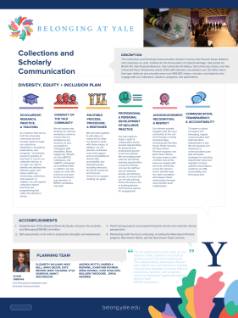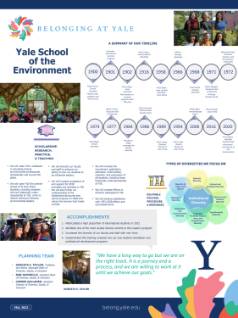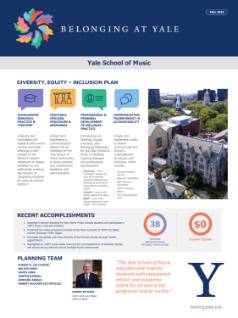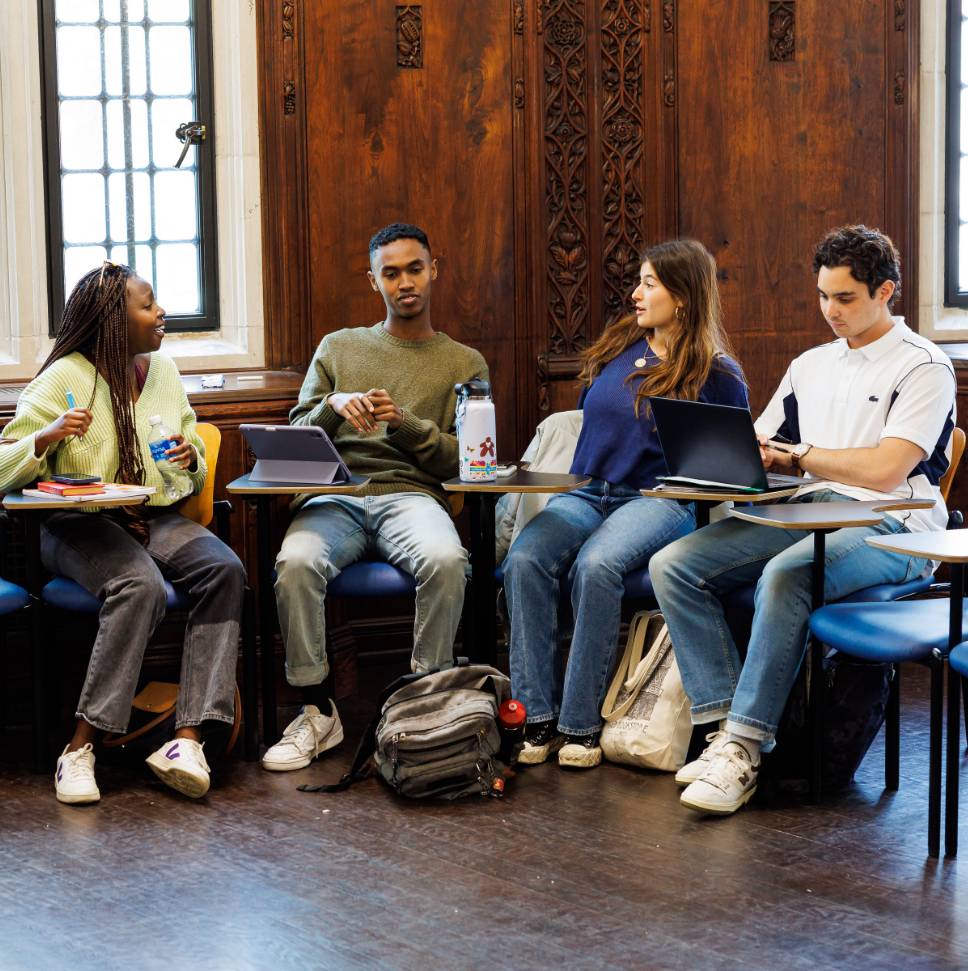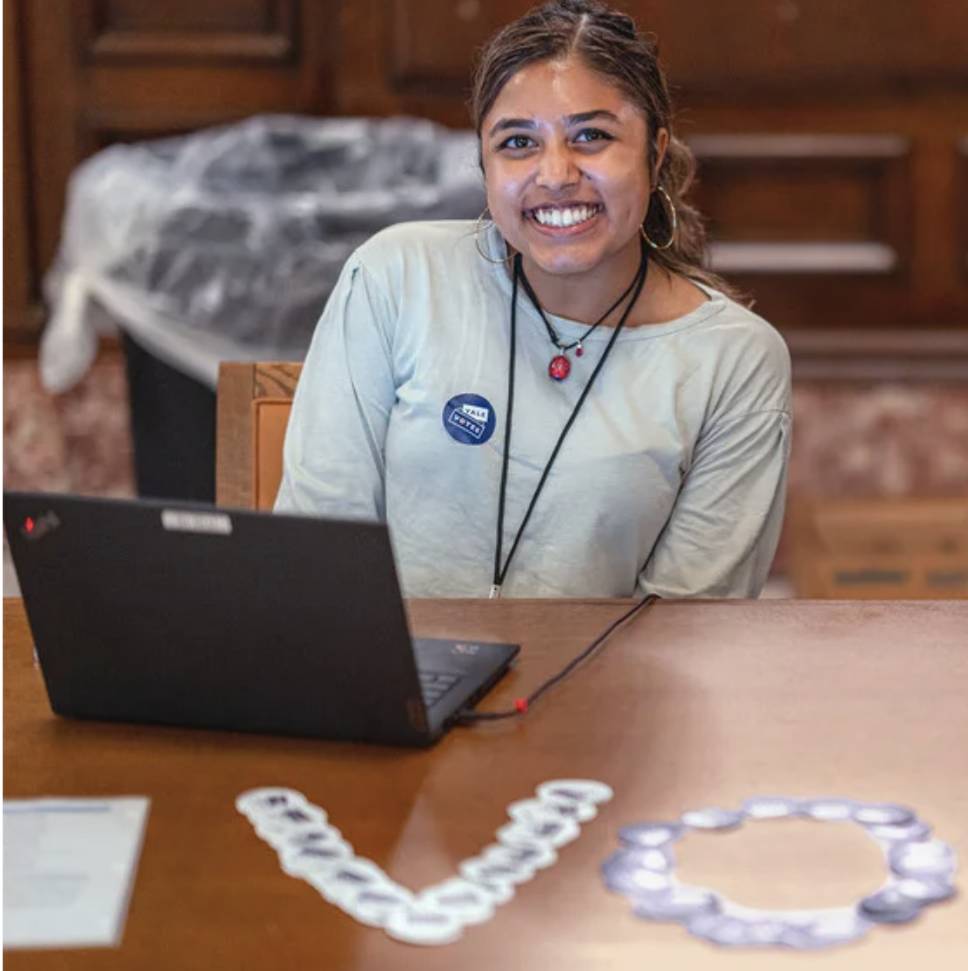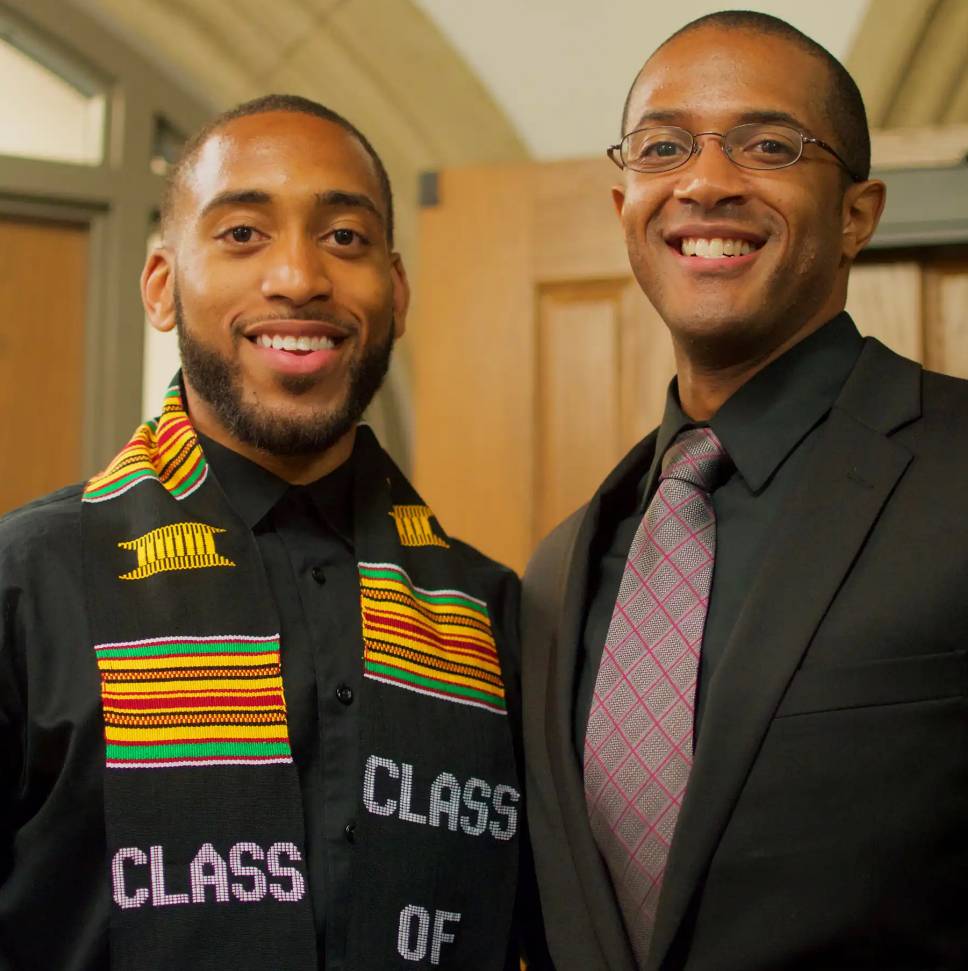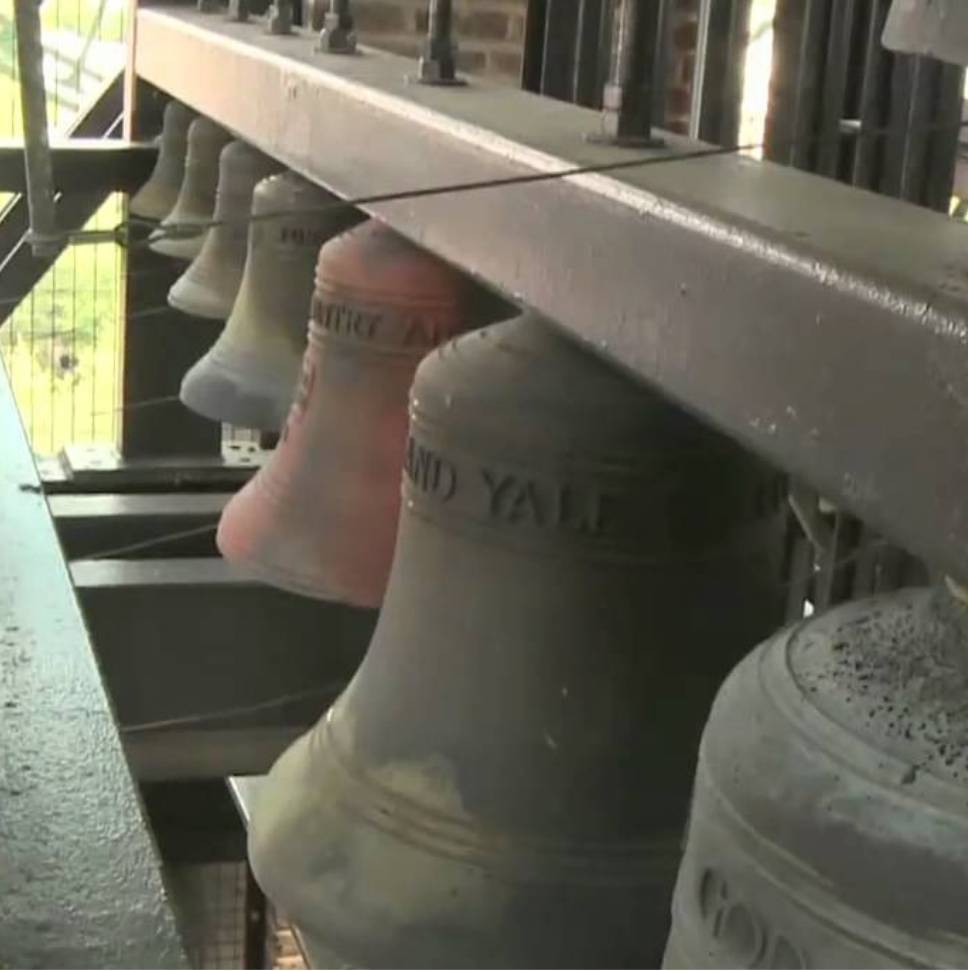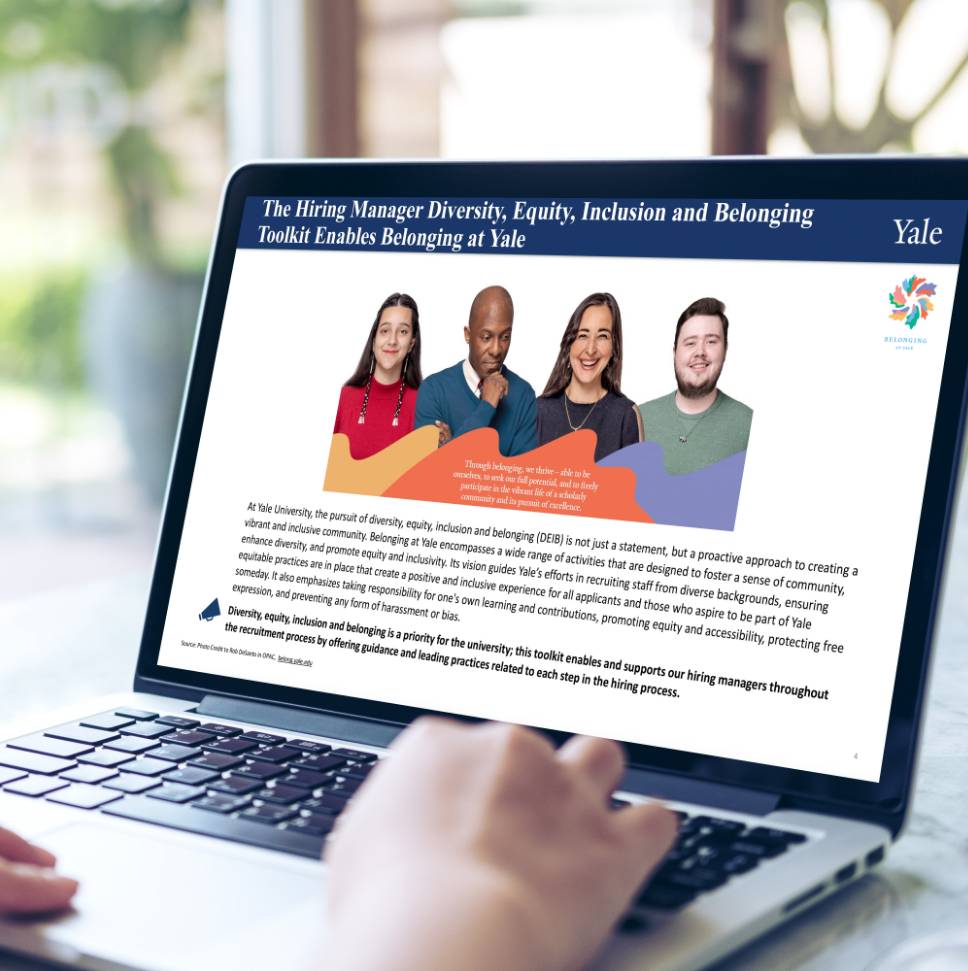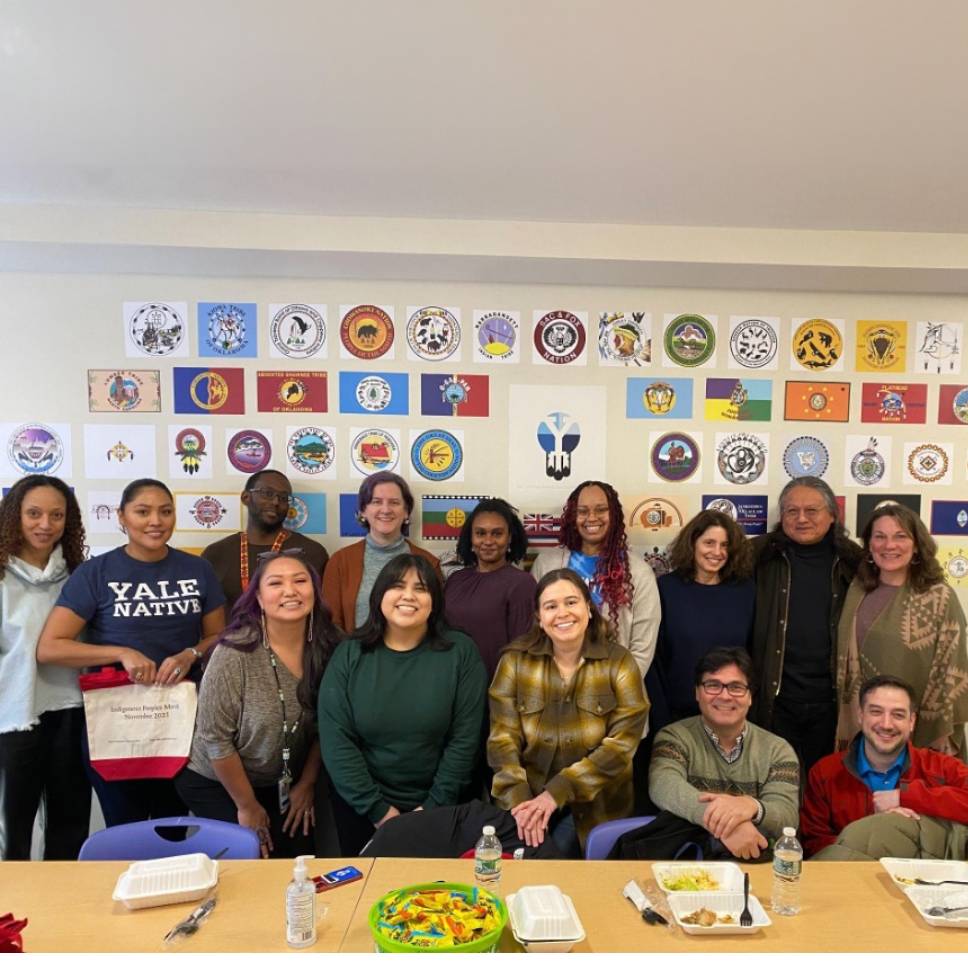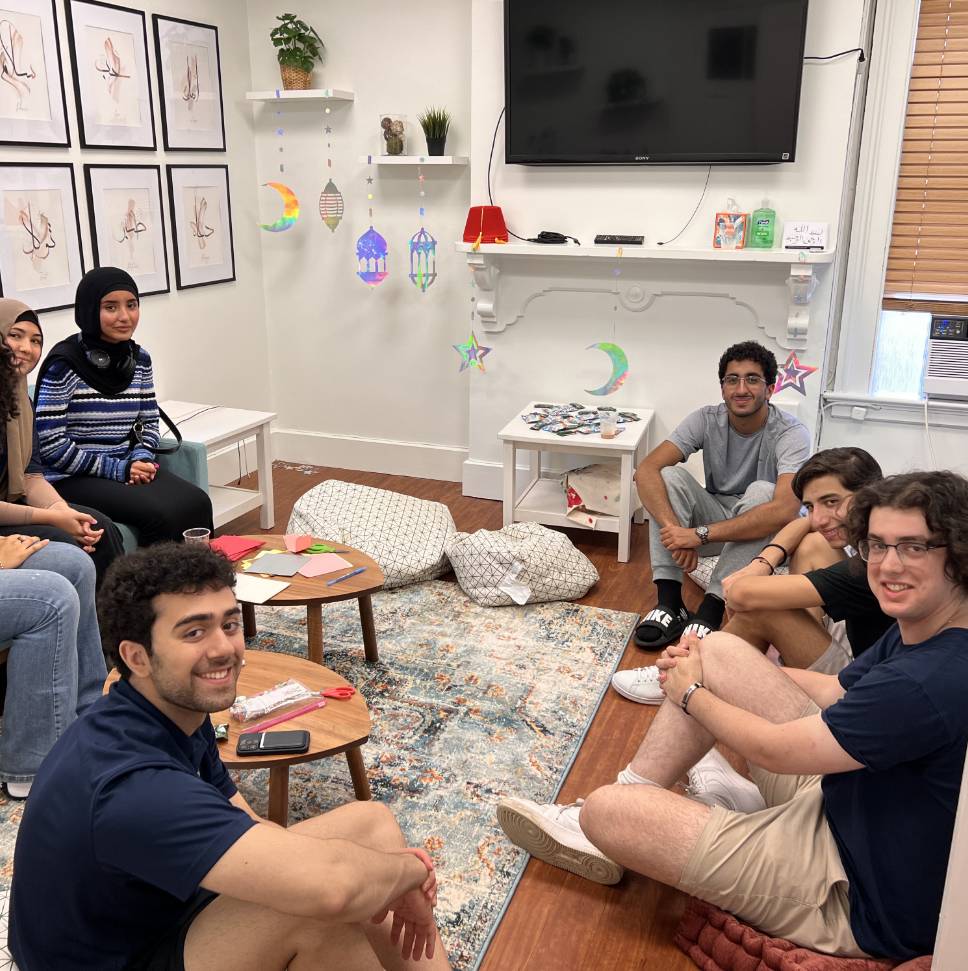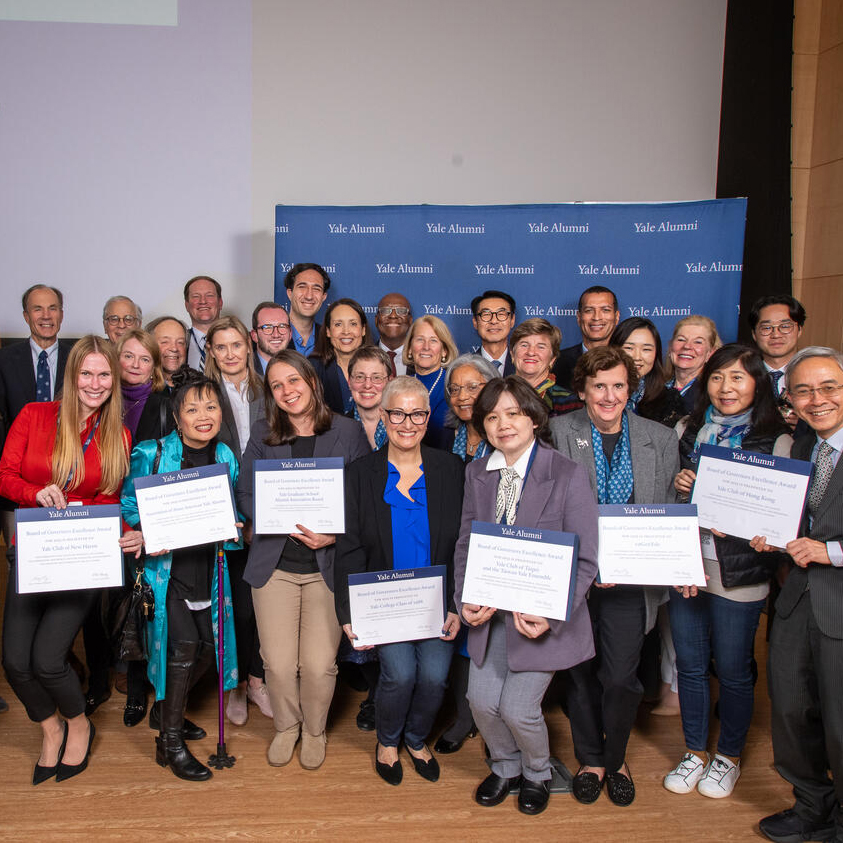Belonging at Yale Annual Report 2023
Belonging at Yale2023 Annual Report

From the Secretary and Vice President for University Life
Together with the university poster and the unit plan posters from schools and administrative units participating in Belonging at Yale, these stories reflect progress in our six focus areas: scholarship, diversity, equitable processes, inclusive practice, acknowledgement and respect, and communication.
Kimberly M. Goff-Crews
Secretary and Vice President for University Life
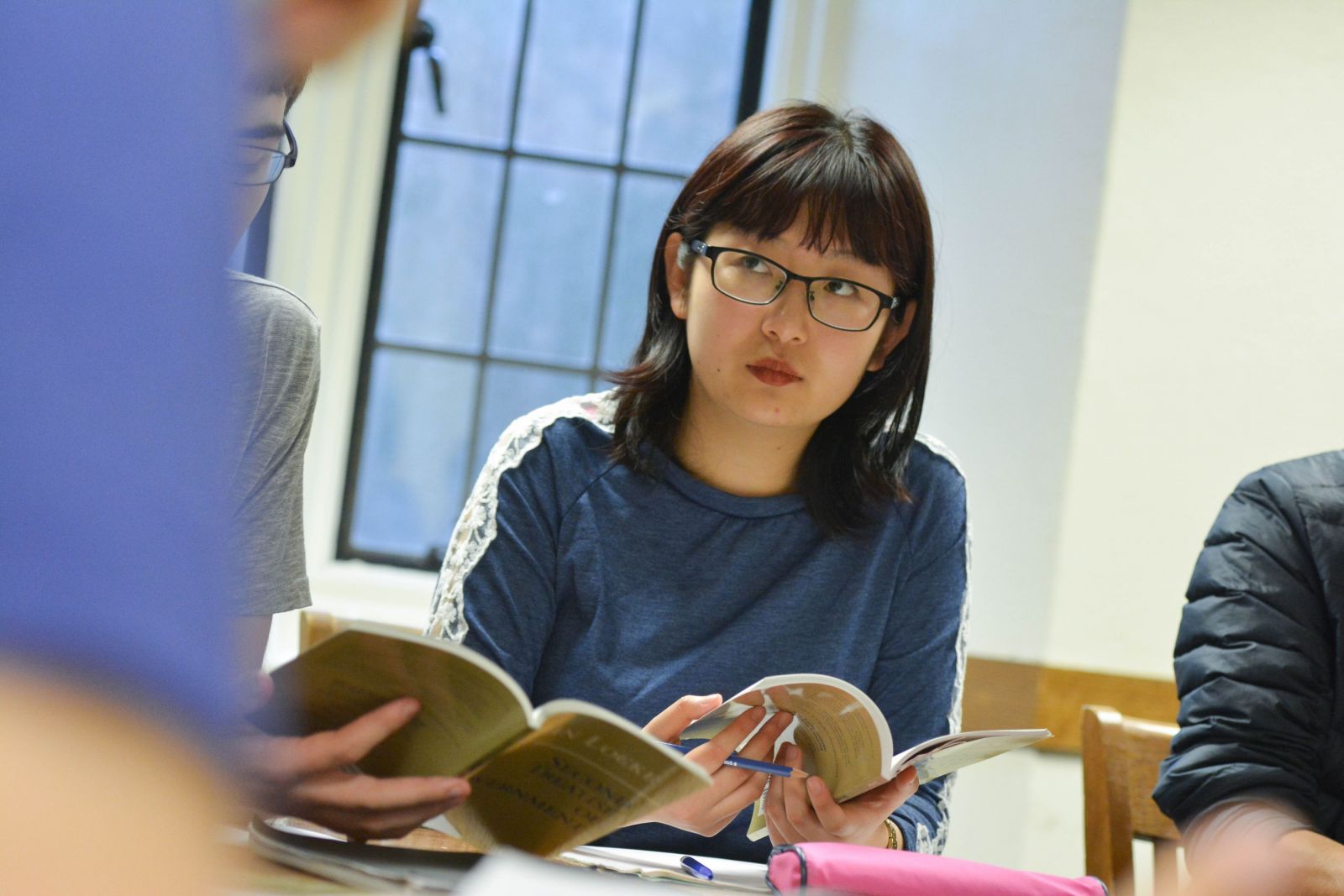
University Priorities
In October 2020, President Salovey announced a set of goals and objectives designed to support an environment in which students, faculty, staff, and alumni with a broad range of experiences and perspectives can contribute to our shared commitment to excellence and our mission to improve the world. These actions are included in the Belonging at Yale Five-Year Action Plan (2020-2025).
President Salovey updated the community on Belonging at Yale progress in October 2021, and in December 2022, he announced new actions in specific response to the research of the Yale and Slavery Working Group. On December 7, 2023, President Salovey announced new university actions against hatred and in support our students and other members of the university community. All these actions are intended to achieve significant and lasting results.
This report features updates on three university priorities: Yale and Slavery; recruiting, supporting, and retaining a diverse faculty; and access to a Yale education for more students. This section also includes examples of commitment and progress across the university in additional priority areas.
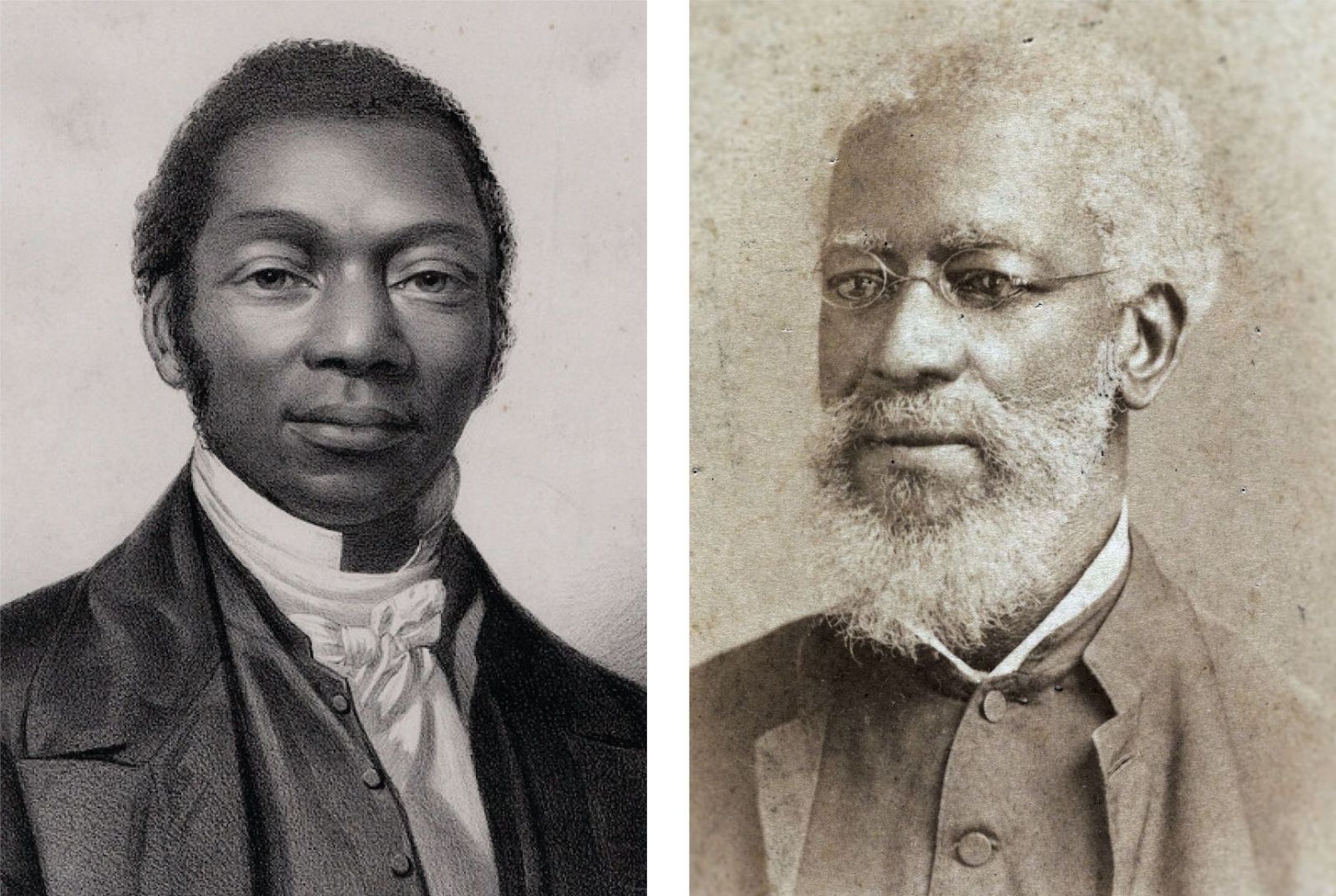
Update
Yale and Slavery
The pursuit of truth and sharing of knowledge is central to Yale's mission. In 2020, Yale began an initiative to better understand our formative ties to slavery and the slave trade in the United States. The Yale and Slavery Working Group has been sharing its research results, and its complete findings will be released as a book, Yale and Slavery: A History, by Professor David Blight on February 16, 2024. In response, Yale is taking intentional actions. This includes the creation of the Pennington Fellowship, which supports New Haven public school students who choose to attend Historically Black Colleges and Universities. In its first year, the fellowship has awarded scholarships to eight students who now attend Morgan State University, Hampton University, Howard University, Spelman College, and North Carolina A&T State University.
At a public event in Yale's Battell Chapel in September, held to celebrate the M.A. privatim degrees awarded posthumously to the Reverends James W.C. Pennington and Alexander Crummell and including members of their families, President Salovey spoke of the leadership and intellectual contributions of the Reverend Pennington and Reverend Crummell despite the challenges they endured, and shared a public apology.
Building on commitments to New Haven and continuing the university's Belonging at Yale work is core to enhancing diversity, equity, and inclusion efforts. This work is a part of a journey, and there is more to come.
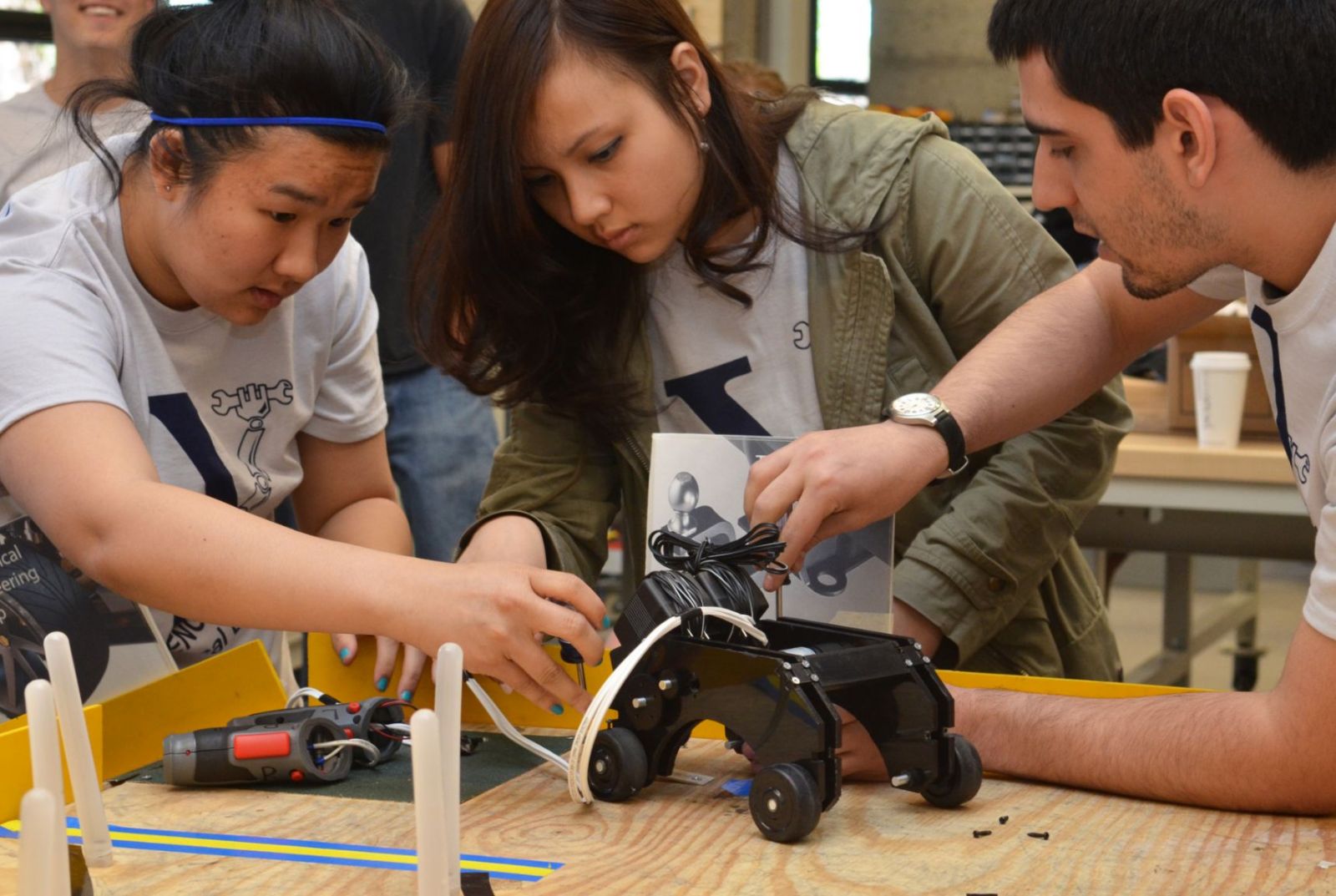
Update
Access to Education
The university's commitment to making a Yale education accessible through financial aid and other supports continues to attract a diverse student body. Of the 1,647 new first-year undergraduates, 22 percent were eligible for the Pell Grant for low-income students (compared to 12 percent of students a decade ago). A majority of first-year undergraduates — 59 percent — are U.S. members of a minority racial or ethnic group, and more than one-fifth of the class are first-generation college students. In the Law School, the incoming class is the most diverse ever, continuing an eight-year trend. Of the new J.D. students, 57 percent are students of color, and more than half are women. The Graduate School of Arts and Sciences incoming class is 57 percent international students, who enrich the campus with unique perspectives.
To build on these advances in affordability and accessibility, Yale announced last year the historic goal of raising $1.2 billion for student support. As increasing access to Yale is vital to the future of the university and its contributions to the world, this initiative focuses on new giving for scholarships and fellowships across the university. In February 2023, the School of Medicine announced a $25 million gift from The Starr Foundation toward medical student financial aid, and the Law School expanded its Hurst Horizon Scholarship Program, significantly increasing the number of students who will receive financial aid for tuition, health insurance, and fees. And the Divinity School is now meeting the full tuition needs of all students receiving financial aid.
The Dean's Emerging Scholars program provides funding for outstanding doctoral students from traditionally underrepresented backgrounds in the Graduate School of Arts and Sciences, expanding the universe of diverse faculty throughout higher education.
In response to the Supreme Court decision in June 2023 regarding affirmative action in admissions, and in keeping with the ruling, Yale College, the Graduate School of Arts and Sciences, and Yale's professional schools have established new outreach and engagement efforts to continue to recruit an excellent and diverse student body.

Update
Faculty Diversity
Yale has made faculty diversity a top priority through the Faculty Excellence and Diversity Initiative, or FEDI. Established in November 2015, FEDI provides matching funds from the central university to Yale's schools for making academic appointments that enrich the excellence and diversity of tenured or tenure-track (“ladder”) faculty. FEDI also supports a cohort of Presidential Visiting Fellows — distinguished visiting scholars and practitioners from around the world who bring to Yale unique perspectives on research, practice, and teaching. In 2019, President Salovey announced a five-year renewal of FEDI and increased its budget by 70 percent, from $50 million to $85 million.
Thus far, FEDI has supported 176 appointments of tenured and tenure-track faculty, and 63 Presidential Visiting Fellows. This year, 21 percent of new ladder faculty come from underrepresented groups. By comparison, in 2010, only six percent of new Yale faculty members came from underrepresented groups, and over the last ten years, the average was 12 percent. New faculty have cited Belonging at Yale commitments in addition to Yale's excellence and resources, as a factor in their decision to join the university.
Scholarship
17 millionitems within museums, libraries, and archives
In libraries, classrooms, labs, and studios, innovative scholarship initiatives have increased inclusion, accessibility, and belonging across Yale.
At the School of Engineering and Applied Science, the Mechanical Engineering & Materials Science Department engaged engineer Ronald Adrezin and Marcus Johnson, an advocacy specialist for people with disabilities, to develop and teach a pair of courses on the design and prototyping of technology to support the disability community.
The School of Architecture, in conjunction with the Law School; Gilder Lehrman Center for the Study of Slavery, Resistance, and Abolition; and the University of Michigan Law School, offered the course “Slavery, Its Legacies, and the Built Environment,” which combined law, history, land use, architecture, and other disciplines to guide student teams as they envisioned designs for a national slavery memorial in Washington, D.C.
In June, the university unveiled LUX, a groundbreaking online platform that allows anyone to explore the vast collection of over 17 million cultural and scientific items in Yale's libraries, museums, and archives. Jacqueline Goldsby '98 PhD, the Thomas E. Donnelly Professor of African American Studies and Professor of English, used the “linked data” concepts of LUX in her work as co-director of the Black Bibliography Project, creating a digital database of bibliographies of African American writers.

Equity, Fairness,
and Justice
100Yale and UNH students assist by providing library research for their incarcerated counterparts
60students at two Connecticut correctional facilities are served by the program
President Salovey has identified addressing the legacy of slavery and the ongoing challenges of racial justice as a priority across the university. In response, a number of initiatives have been launched or have grown to confront systemic racism and other forms of exclusionary injustice.
Projects such as the Center for Yale Law and Racial Justice and the Center for Policing Equity, headed by expert faculty, have advanced both scholarship and practice in this area. Early work under Belonging at Yale included support for centers conducting scholarship and research in fields relevant to addressing racism. Projects headed by expert faculty at the Center for Law and Racial Justice, the Center for Policing Equity, and the Justice Collaboratory (which predates Belonging at Yale) have advanced scholarship and practice in this area.
Through the Yale Prison Education Initiative (YPEI) at Dwight Hall, faculty are bringing courses to incarcerated students, including the only college program in the United States offered to women in federal prison. Dwight Hall is Yale's student-led Center for Public Service and Social Justice.
In June, YPEI, in partnership with the University of New Haven, saw its first cohort of seven incarcerated students graduate with Associate Degrees from the University of New Haven. The graduates were all currently or recently incarcerated. The degree program expands upon existing programs that offer credited Yale courses to incarcerated students. Currently, nearly 60 students at two Connecticut correctional facilities are served by the program. Some 100 Yale and UNH students assist by providing library research for their incarcerated counterparts through the Research Request Network.
Since 2018, YPEI has worked with the Yale School of Art through the donor-established Art and Social Justice Fund to support teaching fellows in the implementation of a summer art program for incarcerated youths. Studio courses and workshops give the incarcerated students an opportunity to expand their art practice and express themselves, while providing MFA students and recent graduates with teaching experience.
Community
Partnerships
local students visited West Campus
Integral to the work of Belonging at Yale is the university's priority to partner with the institutions, leaders, and residents of New Haven and surrounding communities to enhance employment, education, and growth through initiatives on Central Campus and the Medical and West campuses.
New Haven Promise is the Yale-funded college scholarship and career development program for graduates of New Haven public schools. West Campus provides New Haven Promise Scholars with internships at Yale's campus in Orange. In 2023, seven Promise Scholars were awarded internships in science and administration and at the Yale School of Nursing, an increase of 40 percent in the last year.
In 2023, West Campus and its Office of Graduate Student Development & Diversity (OGSDD) again presented the Pathways to Science Festival, welcoming more than 200 middle and high school students from New Haven, West Haven, and Orange public schools for a day of hands-on activities exploring future careers in the sciences. The weekend event showcased West Campus institutes, research core facilities, Yale School of Nursing, and the West Campus Barn.
The Yale Bowl was once again the site of this year's NAACP Harmony Classic football game between Yale and Morgan State University, the historically Black research university in Baltimore, Maryland. Prior to the game, Belonging at Yale hosted a “Be Open Be Curious” breakfast for 135 high school students, sponsored by the Morgan State Alumni Association. The event was also hosted by the Yale Office of Diversity and Inclusion and included Yale admissions and financial aid presentations.
Yale supports both long-established and new learning opportunities for New Haven public school students. This year, Yale joined with the City of New Haven, United Way of Greater New Haven, New Haven Reads, and New Haven Counts as they launched the New Haven Tutoring Initiative. This new city-wide program to tutor at-risk students aims to provide coordinated opportunities for students to learn critical literacy and math skills, build home libraries, and discover the joy of reading and math. Thirty-four Yale students, faculty, and staff volunteered for the pilot program in the summer and fall of 2023.
University
Life
1,000Athletes Coaches Administratorscommitted to learning
Yale brings together people of diverse backgrounds, cultures, nationalities, and beliefs to live, work, play, and discover. A supportive university environment enriches the experiences of students, faculty, staff, and alumni with a spirit of inclusion, acceptance, and belonging.
This year, Yale Athletics began a program to engage more than 1,000 of the university's student-athletes, coaches, and administrators in a series of reflective conversations on the history and continuing impact of racism. Yale Athletics is the first full university athletics department to partner with the anti-racism organization, A Long Talk. The partnership coincided with the department's expansion of Yale Bulldogs for Change into a diversity, equity, and inclusion-oriented organization encompassing all of Yale Athletics' student-athlete affinity groups, grounded in a commitment to tolerance, belonging, and community.
Members of the military and veterans community bring unique and valuable perspectives to Yale, and support for their needs is a priority across the institution. Sixty-seven Air Force cadets (43 students from Yale and 24 students from seven other Connecticut colleges and universities), 35 Naval midshipmen, and 10 Army cadets are enrolled in Yale ROTC programs. At the Law School, recruitment efforts have seen the number of veterans working toward a law degree more than triple in six years. This year, 14 first-year students — seven percent of the incoming Class of 2026 — have served in the military. Two new, full-time staff members also now support the veteran and military community — a liaison for veteran and military affairs and an administrator focused on financial aid.
Senior student-life staff organized discussions and training sessions for colleagues who work with students (including student faith groups) to address discrimination and harassment and support open environments where sensitive topics can be discussed.
In the last year, music has highlighted the Indigenous presence at Yale and beyond campus. In November, Navajo composer Conner Chee premiered a composition written for the Yale Carillon as part of the tenth-anniversary celebration of the Native American Cultural Center. Indigenous history and culture were also celebrated by the Fort Mojave Tribal Band and Rez Life Bird Singers, who visited Yale in October. The musicians joined a ceremonial on-field exchange of gifts with President Salovey at the Yale Bowl prior to the start of a football game, and the Tribal Band joined the Yale Precision Marching Band for the half-time performance. The Yale Alumni Service Corps has organized a 2024 cross-cultural student trip to the Fort Mojave Indian Tribe's Colorado River Reservation, where students will collaborate with tribal members on educational and cultural projects.
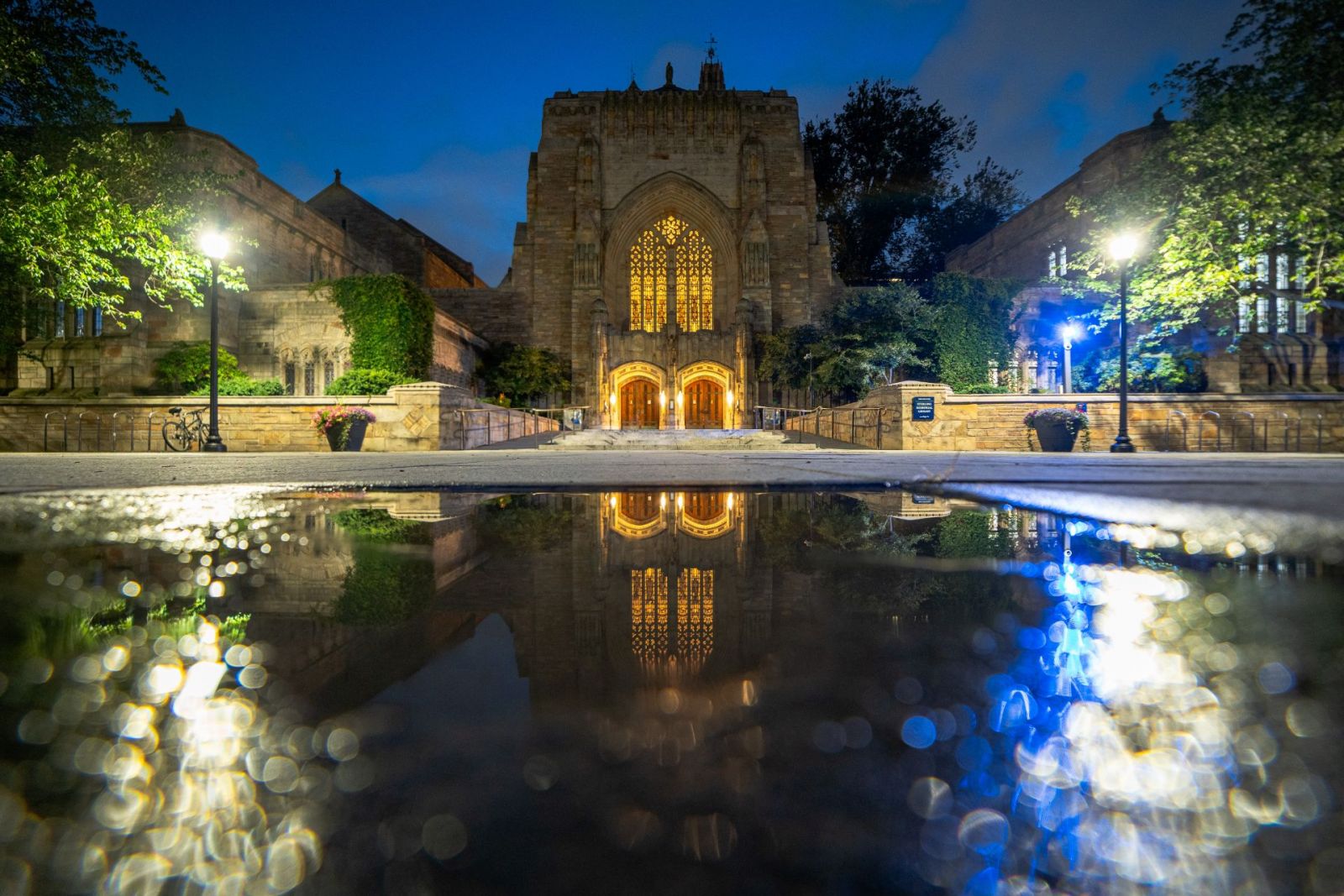
Unit-specific Results
At the request of President Salovey and with support from Belonging at Yale, 28 schools and administrative units across the university have developed and implemented plans reflecting specific and measurable actions they will take to increase diversity, equity, inclusion, and accessibility in their spaces.
The unit plans are built around six areas of focus: scholarship, research, and teaching; diversity of the Yale community; equitable processes, procedures, and responses; professional and personal development of inclusive practice; acknowledgement, recognition, and respect; and communication, transparency, and accountability.
The unit plans address actions that benefit the broader university community in addition to those specific to each unit. Activities include improving communication as well as practices for hiring, retention, promotion, and equity; student recruitment; curriculum review; and accessibility. Professional development is a focus of both administrative and school plans, and schools are also engaging their alumni on issues of inclusion.
Third-year infographic posters developed by schools and units highlight progress toward their goals.
Percent of new faculty are women
Unit plans were created
Units have committed to actions with the City of New Haven
Total actions were pledged for Year 3

Timeline Highlights





2019
The Faculty Excellence and Diversity Initiative (FEDI) was extended for another five years, with an increase in budget to $85 million from $50 million to support ladder faculty and presidential visiting fellows whose backgrounds and/or research interests enhance diversity.
The Emerging Scholars Initiative was created to recruit and retain outstanding graduate students from backgrounds that have been underrepresented in their chosen fields of study, including historically underrepresented minority students, first-generation college graduates, students from economically disadvantaged backgrounds, and women in STEM fields; graduate students who plan to pursue research related to issues of diversity and identity; or those who have been or are currently involved in diversity-related initiatives by volunteering for community service or outreach on a college or university campus.
The Afro-American Cultural Center (“The House”) celebrated its 50th anniversary, recognizing the intellectual, professional, and cultural contributions it has made to the Yale community and to society.
First Yale Alumni Association Impact conference was held. Impact II followed in 2021, and Impact III, in 2023.
50Women150 celebrated the 150th year of the first women students at Yale and the 50th anniversary of the admission of women to Yale College.
2020
President Peter Salovey established the Committee on Diversity, Inclusion, and Belonging and charged its members to review current activities and initiatives and offer a vision for diversity, equity, inclusion (DEI), and belonging; develop goals to achieve this vision; outline strategies to focus resources; and recommend actions to advance these strategies.
With the recommendations from the committee, President Salovey announced a new phase for Belonging at Yale — delving into the university’s history, building on existing work and measuring progress, assessing, and enhancing current actions, and making Yale a more welcoming place for everyone.
Professor and author of “The Person You Mean to Be” Dolly Chugh kicks off the Belonging at Yale Antiracism Speakers Series, followed by Professor Ibram X. Kendi, speaking about his book How to Be an Antiracist. The series continues with grants to schools, academic departments, and student organizations.
A collaborative system to support the safety of all students, faculty, staff, and guests was created by the Office of Public Safety and Engagement and the Office of the Secretary and Vice President for University Life (OSVPUL) in partnership with deans and staff in the schools, the Office of Emergency Management, Mental Health & Counseling, and other units. The OSVPUL now leads the coordination of activities that support the university’s commitments to free expression, including preparations for and responses to protests and high-profile events.
2021
Every school and administrative division on campus submitted its five-year plan to improve diversity, equity, and inclusion and promote a culture of belonging. The plans complement existing institutional actions to enhance diversity, promote equity, and foster an inclusive campus environment. The 27 plans were developed by 150 Yale community members and included more than 230 actions that contribute to a community of belonging.
Yale made an historic investment in the economy of the City of New Haven through a $140 million, six-year pledge toward inclusive growth.
Yale and Slavery Working Group was appointed by President Salovey and held a three-day conference.
The Law and Racial Justice Center was created, led by founder James Forman, J. Skelly Wright Professor of Law. The Center’s mission is to reform public safety and justice systems by developing practical applications that address complex societal issues.
Emerge, a new program for staff who have high potential for leadership roles and who will bring excellence and diversity to the senior ranks, was launched by Human Resources in consultation with the School of Management. Emerge completed its pilot program, with 19 participants, and launched a second cohort, with 21 participants.
The Supplier Diversity Program was created to identify and encourage New Haven minority-owned and women-owned businesses to bid for Yale contracts for services and supplies. The university established a “Net-15” policy through which local vendors are paid within 15 days of receipt of invoices.
The Office of Institutional Equity and Accessibility, Title IX, Student Accessibility Services, and the University Advisory Committee on Accessibility Resources were brought together under common leadership, and staff were added to meet significantly increased needs in the university community.
The Asian-American Cultural Center celebrated its 40th anniversary with a series of virtual events and the creation of a commemorative mural on the outside of the building.
2022
For Humanity, Yale’s capital campaign, announced that $1.2 billion would be raised for increased financial aid and fellowships in all schools.
1stGenYale, an alumni affinity group, placed 126 Yale College students on financial aid in 86 summer internships. Projects included research for Yale faculty (in the Schools of Public Health, Medicine, and Management) as well as non-Yale faculty, and internships at domestic and international institutions in the arts, education, science, government, social justice, and public service.
In early 2022, a communications project to inform and engage students, faculty, staff, and alumni was launched in collaboration with the Office of Public Affairs and Communications. Focused on opportunities for members of our university community to learn, experience, and act, this work includes monthly themes and opportunities for connection.
Schools and administrative units updated their Belonging at Yale plans and reviewed progress toward their goals. West Campus joined 27 other units creating action plans for the 2022-2023 year.
President Peter Salovey and Provost Scott Strobel announced the results of Yale’s first university-wide faculty climate survey, designed to help identify both strengths and areas that need additional work to foster a more productive, vibrant, and inclusive campus culture for the faculty.
A new scholarship, paid by Yale through the New Haven Promise program and named for James W.C. Pennington, the first Black student to attend Yale, will support local students attending historically Black colleges and universities (HBCUs).
2023
On March 24-25, the Yale Alumni Association held the third IMPACT conference for alumni, with the theme Building an Equitable Future.
On April 24, President Salovey announced that the board of trustees had conferred honorary degrees on James W.C. Pennington and Alexander Crummell, who studied at Yale in the 1830s and 1840s but could not enroll because they were Black.
On June 14, President Salovey announced the creation of the Committee for Art Recognizing Enslavement (CARE), which will commission art and related programming to address Yale's historic associations with slavery and the legacy of that history.
On June 29, following Supreme Court decisions on the consideration of race in college admissions, President Salovey affirmed Yale's commitment to a diverse and inclusive community and to using all lawful means to achieve and maintain the diversity of the student body.
On September 14, a ceremony in Battell Chapel marked the celebration of the conferral of honorary degrees on James Pennington and Alexander Crummell.
On November 10-11, Henry Roe Cloud Conference participants celebrated the tenth anniversary of the Native American Cultural Center with speakers, music, research presentations, an archive gallery, and social events. Cloud, a member of the Winnebago nation, is the first known Native American to graduate from Yale, in 1910.
On December 8, the university published infographic posters highlighting the priorities and accomplishments of Yale's schools and administrative units under their Belonging action plans.
 Be Open Be Curious
Be Open Be Curious
In 2023, Belonging at Yale continued its commitment to fostering meaningful connections and supporting a shared sense of belonging on campus and in the community through support for events, resources, and learning opportunities that promote diversity, equity, inclusion, and accessibility.
In partnership with the Office of Public Affairs and Communications and building on the 2022 “What we will be — together” campaign, students, faculty, staff, and alumni were invited to be open and to be curious about our vibrant university community. Monthly themes invited all constituencies to explore new pathways and experiences and to learn more about what it means to belong at Yale.
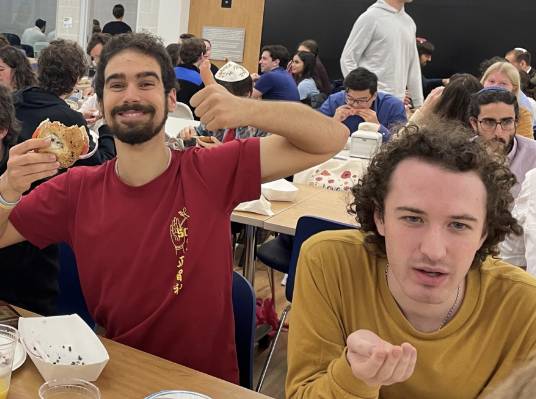
Be Open to Building Community… Over Bagels
In partnership with Belonging at Yale and through outreach by Yale social channels and university communicators, beginning in January 2023 leadership of the Joseph Slifka Center for Jewish Life invited all Yale community members to visit and participate in bi-monthly bagel brunches. The brunches offer an informal setting to share a meal with old and new friends. Learn more about the Slifka Center.
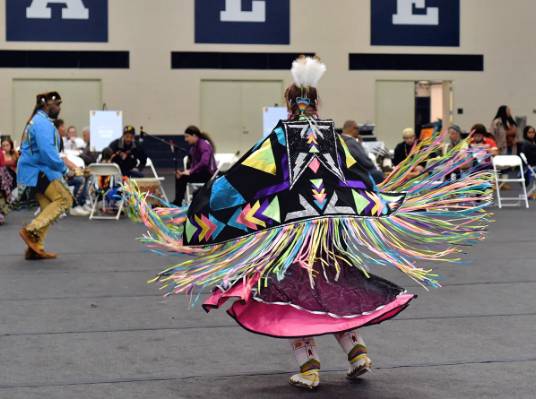
Be Curious About Tradition 2023 Powwow: Roots and Regrowth!
The Native and Indigenous Student Association at Yale and the Native American Cultural Center presented an intertribal powwow, honoring the diversity of the Native American people and celebrating the practice of tradition. The event featured opportunities to observe and enjoy beadwork, regalia, songs, and drums used by talented Native artists from Yale and local communities. Learn more about the Native American Cultural Center.

Be Open to Learning About Accessibility
An invitation to learn about accessibility services at Yale included information on how to plan an accessible event, design an accessible website, and more. Explore these resources on the Accessibility Services website.

Be Curious About Veterans
Two events were among those honoring veterans in November: a Veterans Day display at the Beinecke Library highlighting a collection of photographs, correspondence, and other archival materials and the annual Yale Veterans Day Ceremony. Read a Yale News story about the Veterans Day Ceremony.

Addressing Bias and Hatred
As bias and hatred rise around the world and in our nation, we must support and educate members of our university community.
In December 2023, President Salovey wrote to the Yale community, speaking out against hatred and identifying next steps in the university’s commitment to nurture Jewish life and Arab, Muslim, and Middle Eastern and North African (MENA) life on campus, to focus on safety, and to support an environment in which free expression can thrive.
A new standing advisory committee will expand the work already begun by the Yale Antisemitism Campus Climate Group, begun in partnership with the Joseph Slifka Center for Jewish Life and Hillel International in 2022, and will continue to examine ways the campus can be improved for Jewish students.
Also building on efforts already underway, a new standing advisory committee, expanded from the existing advisory group on Arab, Muslim, and MENA life, will advise on issues and ways in which Arab, Muslim, and MENA (including Palestinian) students can be supported.
Both advisory committees will report to Secretary and Vice President for University Life Kimberly Goff-Crews and will identify opportunities for their work to intersect.
We will also provide new and increased resources and opportunities to continue the work already begun to enhance the student experience, fostering an environment in which community members with diverse beliefs, perspectives, and cultures have a voice and in which all students, faculty, and staff feel welcome and respected.
Cultivating Conversation
Through the Cultivating Conversation initiative, we will continue to bolster a culture of free exchange, model dialogue, and strengthen relationship-building skills and social connections. Cultivating Conversation will amplify and promote events that model respectful discourse and provide the opportunity for observational learning as well as access to a broad range of perspectives, opinions, and approaches to dialogue. The initiative will also continue to encourage respectful and open engagement, support skill-building, and add resources to help members of our university community resolve conflicts.
Yale and Slavery
In February 2024, Yale and Slavery: A History, a new book by David Blight, the Sterling Professor of History, of African American Studies, and of American Studies, and director of the Gilder Lehrman Center for the Study of Slavery, Resistance, and Abolition, will be published. While Yale has already begun to take steps to account for its history related to slavery, the findings presented in Professor Blight’s book will influence Yale’s acknowledgement of our past and inform future efforts to address our history, both across the university and in New Haven. You will be able to learn about these efforts on a new website, launching in February, and in next year’s Belonging Annual Report.
